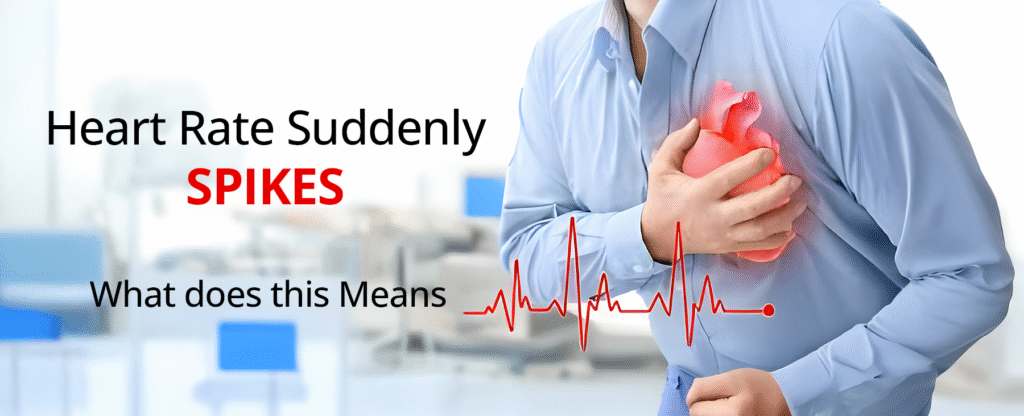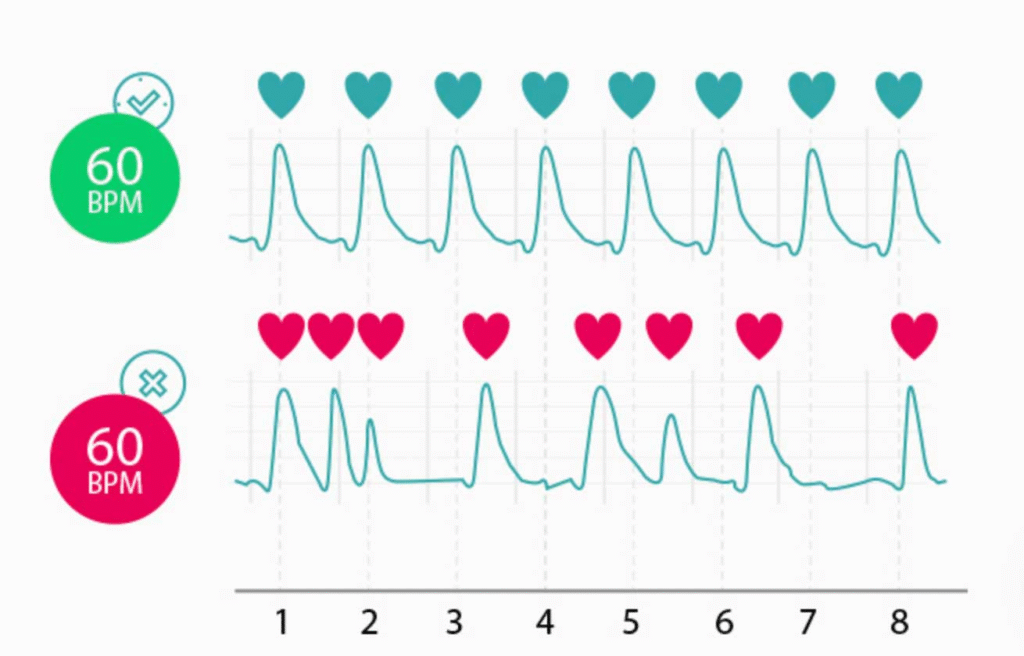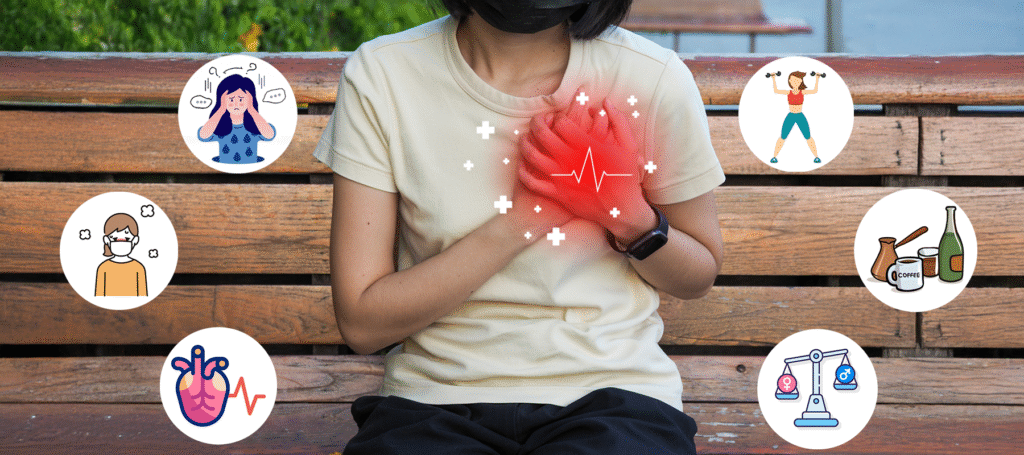Why Your Heart Rate Spikes Suddenly and What It Means

Ever feel your heart pounding out of nowhere? One minute you’re calm, and the next, your pulse is racing like you’re running a marathon. Sudden heart rate spikes can be jarring, especially when they come without warning. But what do they mean? Should you worry? Let’s break it down in a way that actually makes sense.
Understanding Heart Rate: What Is Normal?

Your heart rate is the number of times your heart beats per minute. For most healthy adults, a resting heart rate ranges from 60 to 100 beats per minute. Athletes or very fit individuals might have lower resting rates, sometimes even in the 40s.
But what about sudden surges?
Sudden Heart Rate Spikes: When Should You Worry?
Not every increase in heart rate is dangerous. Some spikes are completely normal, especially during exercise or moments of emotional excitement. But some might signal underlying health issues.
How Fast Is Too Fast?
A heart rate over 100 beats per minute while you’re resting is called tachycardia. If it comes with no clear reason, that’s a red flag.
Symptoms That Accompany Sudden Spikes
If a racing heart is paired with these symptoms, seek help:
- Dizziness
- Shortness of breath
- Chest pain
- Sweating
- Fainting
These may indicate something more serious like a cardiac arrhythmia or heart condition.
Common Causes of Sudden Heart Rate Increases

Physical Exertion or Exercise
This is the most obvious and least concerning cause. Your heart speeds up to meet your body’s increased oxygen needs.
Emotional Stress or Anxiety
Ever had your heart race before a big presentation or after a scare? That’s adrenaline doing its job. Chronic stress, however, can cause long-term issues.
Stimulants (Caffeine, Nicotine, Medications)
Too much coffee, certain cold medicines, or even energy drinks can send your pulse soaring.
Fever or Infections
Your heart works harder when your body is fighting off illness, especially if you have a fever.
Hormonal Imbalances
Thyroid disorders (like hyperthyroidism) are known for causing elevated heart rates.
Cardiac Arrhythmias
Sometimes, the problem lies in your heart’s electrical system. Conditions like atrial fibrillation or supraventricular tachycardia can cause rapid, irregular beats.
To explore further about arrhythmias, visit nhearthospital.com.
When a High Heart Rate Becomes Dangerous
Persistent or sudden, unexplained spikes might indicate a deeper cardiac issue. The concern grows when your heart struggles to pump blood efficiently.
Symptoms such as chest discomfort, fainting spells, or fatigue during mild activity warrant immediate medical attention.
Potential Health Risks of Frequent Heart Rate Spikes
Long-Term Impact on the Heart
Constant overworking of the heart may lead to cardiomyopathy, a condition where the heart muscle weakens over time.
Increased Risk of Stroke or Heart Failure
Irregular rhythms, especially in atrial fibrillation, increase the risk of clots, which can cause strokes or heart failure if not treated.
Diagnosing the Cause of a Sudden Spike
Electrocardiogram (ECG) and Holter Monitoring
An ECG captures your heart’s electrical activity. For patterns that don’t occur consistently, your doctor might recommend a Holter monitor to track your heart over 24 to 48 hours.
Stress Tests and Blood Tests
Stress tests evaluate how your heart performs under pressure, while blood tests can reveal hormone levels, infections, and more.
Northern Heart Hospital offers all of these diagnostic tools in-house. Learn more at nhearthospital.com.
How Northern Heart Hospital Can Help
At Northern Heart Hospital, you’ll find world-class cardiologists, state-of-the-art diagnostic tools, and patient-focused care. Whether it’s a simple concern or a complex heart rhythm disorder, they’re equipped to handle it all.
Treatment Options: Medical and Lifestyle-Based
Beta Blockers and Antiarrhythmic Medications
Medications like beta blockers help slow your heart rate. Antiarrhythmics may be prescribed for rhythm correction.
Avoiding Triggers and Making Lifestyle Changes
Cutting down on caffeine, managing stress, sleeping better, and staying hydrated can help reduce episodes. Cardiac rehab programs, available at nhearthospital.com, can guide you step-by-step.
When to See a Heart Specialist

If you’re experiencing regular unexplained spikes or concerning symptoms, don’t wait. Early diagnosis can prevent serious complications. Book a consultation with a cardiologist or electrophysiologist at nhearthospital.com.
Final Thoughts
Your heart rate is a window into your overall health. While it’s normal for your pulse to rise now and then, unexplained or persistent spikes are your body’s way of saying, “Something’s not right.” Listening to it could save your life. Stay informed, seek help when needed, and take your heart health seriously.
FAQs
Q1: Can dehydration cause a sudden spike in heart rate?
Yes, dehydration lowers blood volume, which forces your heart to work harder to circulate blood, often resulting in a faster pulse.
Q2: Is it normal for heart rate to spike during sleep?
Brief fluctuations can be normal, but sustained high rates during sleep may point to sleep apnea or arrhythmias.
Q3: Can anxiety mimic heart problems?
Absolutely. Panic attacks often cause chest pain, shortness of breath, and a racing heart. But it’s crucial not to dismiss symptoms without evaluation.
Q4: How can I track my heart rate accurately at home?
Smartwatches, chest strap monitors, or even manual pulse checks can help. For a more accurate diagnosis, visit a cardiologist.
Q5: What is the best time to check resting heart rate?
Early morning, right after waking, before you get out of bed is the ideal time.
